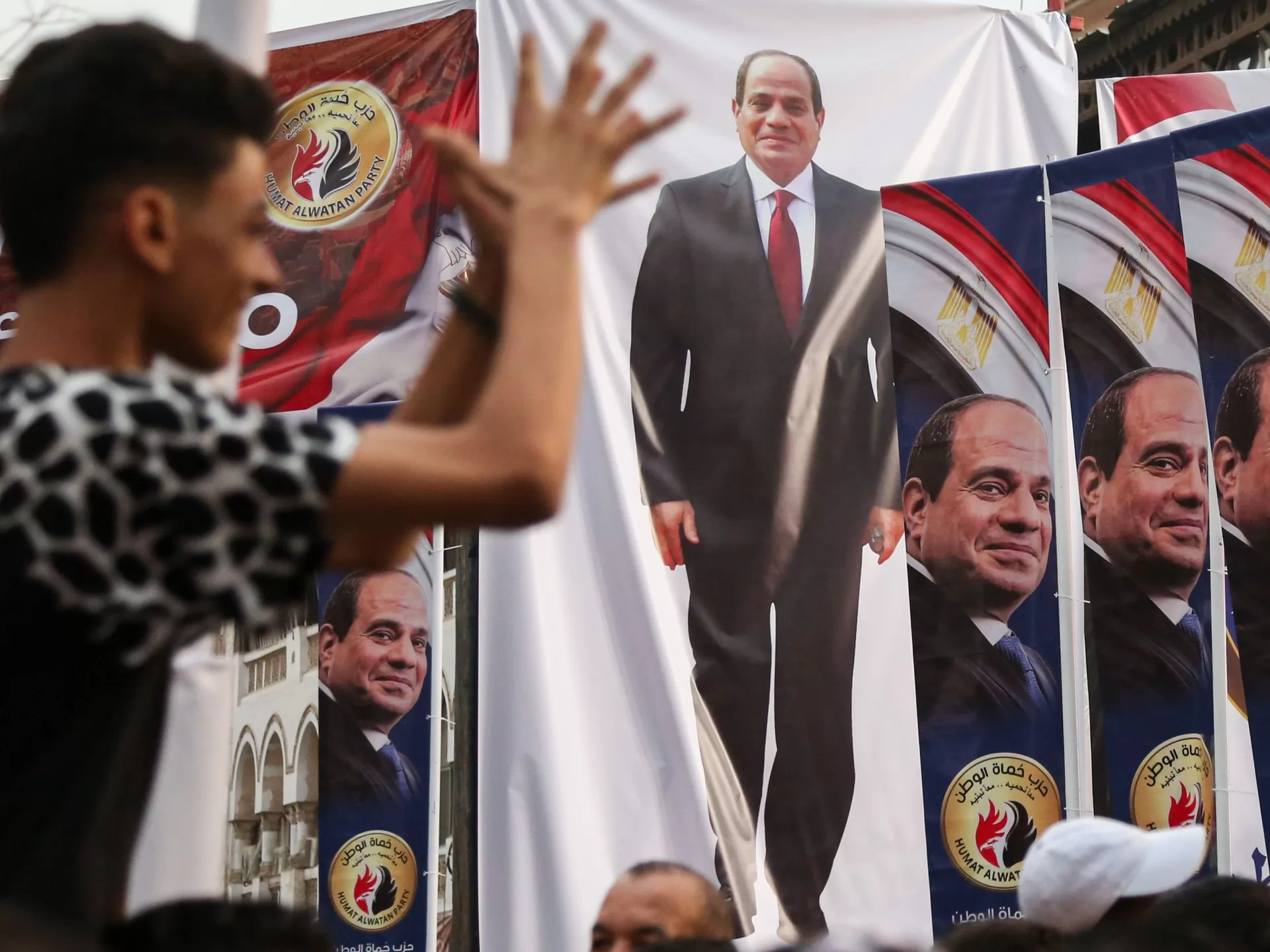The face may be the same, but the circumstances are different as Egyptians head to cast their ballots on December 10.
The economy is in a tailspin, held up by support from foreign partners worried about Egypt’s slide setting off regional destabilisation not seen since 2011, including new migration flows to Europe and beyond.
Beyond Egypt’s frontiers, its neighbours are locked in seemingly intractable conflicts, with civil war raging in Sudan, and in Libya, rival governments vie for power on Cairo’s doorstep.
In 2022, public debt in Egypt stood at above 88 percent of the country’s GDP, more than double the region’s average. Inflation has consistently been above 35 percent since June.
Across the country, as household finances shrink, record numbers of Egyptians are reportedly searching for a second job while cutting back on household spending, including less and cheaper food. However, many analysts expect el-Sisi to win the upcoming election.
Government
Over the nine years he has been in office, the president has cemented his hold on power.
Critics, such as the veteran publisher and government critic, Hisham Kassem, languish in jail. In 2019, a constitutional referendum in Egypt resulted in the extension of the presidential term to six years. In the lead-up to the results of the referendum, the internet monitoring organisation NetBlocks said it had tracked 34,000 websites, including “technology startups, self-help websites [and] celebrity homepages” that had been shut down.
Against that background, el-Sisi’s closest rival, the left-wing Ahmed el-Tantawy withdrew his candidacy in October alleging a campaign of intimidation, including the tapping of his phone.
Egypt’s National Election Authority has described all his accusations as baseless. Meanwhile, the Egyptian president appears to have the army’s unflagging support. And he has no clear opponent.
“Even if the public could envisage a political alternative, there’s the fact that the opposition remains in disarray,” David Butter, an associate fellow at Chatham House said. “Much of the idealism of the revolution [of 2011] got overshadowed by the Muslim Brotherhood’s campaign, which led to chaos and, eventually, el-Sisi.
“For many people across Egypt, el-Sisi’s presidency is just a fact.”
Economy
Egypt faces major economic challenges. Domestic production struggled to meet the demand of the Middle East’s most populous country even before Russia’s invasion of Ukraine in February 2022. The ensuing international grain shortages pushed what was already a food crisis into an existential economic threat.
Price rises on Egypt’s basic subsidised goods put them beyond the reach of many. According to government figures from 2020, the most recent available, the poverty rate had reached approximately 30 percent.
The Egyptian pound has plummeted to about 50 against the US dollar on the black market, as opposed to an official rate of 31.
Debt repayments, due to start next year, stand at $42.26bn, and many analysts expect austerity measures might be introduced once the election has passed.
Meanwhile, the government has pushed ahead with several mega projects, such as building a new capital outside Cairo.
Over the last decade, the United Arab Emirates and Saudi Arabia have extended millions in credit lines to a beleaguered Cairo. The IMF has extended a loan of $3bn, the fourth such instance of support in the last six years. Public debt, estimated to be around 85 percent of Egypt’s annual production, has led to a dollar crisis, as both the public and the government scramble for hard currency either to get their household through the week or release millions in imports sitting in harbours around the country, waiting for customs to be paid.
Regional clout and balance
Some analysts believe that Egypt’s influence in its neighbourhood and beyond has declined in recent years.
“What was once the foremost power within the Middle East has seen its regional and international relevance slip,” Riccardo Fabiani, a project director at the Crisis Group said from Egypt. These analysts argue that in Libya and Sudan, both neighbours, other regional powers are playing a greater role.
But many others, including in Egypt, don’t agree. They point to Egypt’s successes in combating armed groups, and its success as a regional powerbroker, while engaging on an equal footing with its counterparts in the Gulf. Analysts within Egypt have also pointed to the pivotal role Cairo has played during negotiations between Israel and Hamas and in securing new aid for those besieged within Gaza.
Perhaps the greatest evidence of Egypt’s strategic influence lies in how a range of nations and global organisations have stepped up to help the country deal with its economic challenges.”
Egypt’s in debt to just about everyone,” Butter said. “However, no one has any interest in seeing Egypt destabilised.”
The crisis in Gaza adds to Egypt’s challenges, which is why “the IMF is already augmenting the support it’s extending,” he said, adding that this also reflects the mood among Egypt’s backers in the US, Europe and the Gulf. All of that “gives Egypt an outsize influence in pushing for more aid to enter Gaza”, said Fabiani.
The last elections in Egypt, in 2014 and 2018, with varying turnout, both returned a vote of 97 percent in support of President el-Sisi. Within days, Egypt will likely deliver another victory.
But in a country faced with an economic crisis, and in a region grappling with multiple wars and fissures, a third term for el-Sisi likely won’t be easier than the first two.
